37 Wings of Change: Lessons 1-14
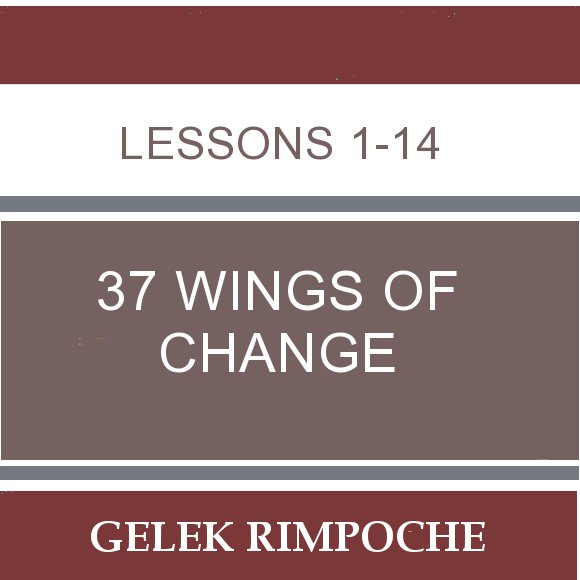
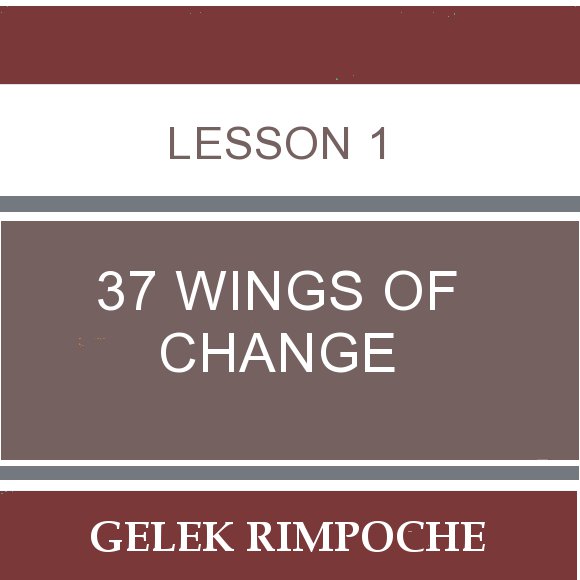
Lesson 1: 37 Wings of Change
Lesson Number 1 of 28
Lesson 1
Can belief in the Buddha alone be the cause for one’s own enlightenment? In this lesson, Gelek Rimpoche tells us that no external Buddha is going to suddenly appear to us and instantly make us perfect. If that is true, then what is the way to enlightenment through the Buddhist practice? Refraining from doing harm and helping ourselves and others is actual spiritual development and that will shine out to others. Rimpoche tells us that we must ‘wake up’ the good, beautiful nature within ourselves, and nurture it with daily practice.
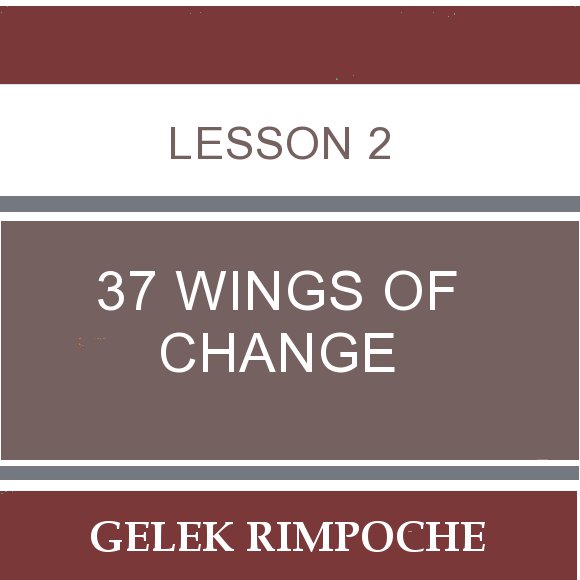
Lesson 2: 37 Wings of Change
Lesson Number 2 of 28
Lesson 2
How does the chanting of a mantra help us move toward liberation? In this lesson, Gelek Rimpoche explains how tantric practice and mantra recitation are linked, how mantra recitation actually protects our minds from delusion. Rimpoche gives us the meaning of the mantra of Avalokiteshvara, the famous OM MANI PADME HUM mantra of the Tibetans, and helps us understand that both wisdom and compassion are necessary for our personal and spiritual development.
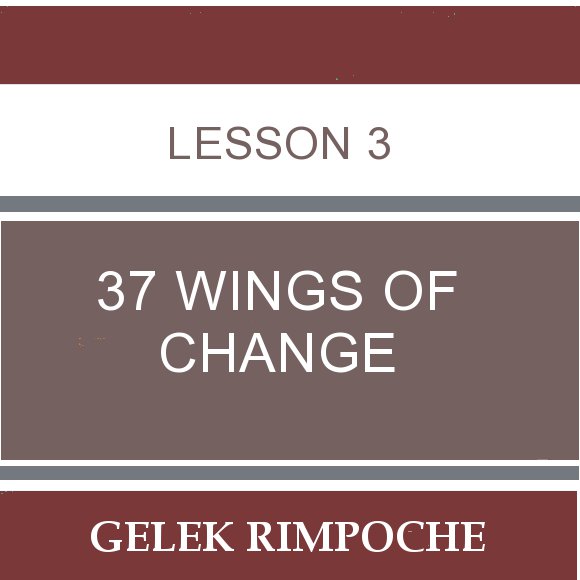
Lesson 3: 37 Wings of Change
Lesson Number 3 of 28
Lesson 3
The Four Mindfulnesses are the first four of the Thirty-Seven Wings of Enlightenment. In this lesson, Gelek Rimpoche elaborates on the Mindfulnesses of our Body, Feelings, Mind and Phenomena, and explains how each of these are individually connected to the Four Noble Truths. In dialogue with the audience, Rimpoche further explores the idea of discrimination between pain, pleasure, and true joy.
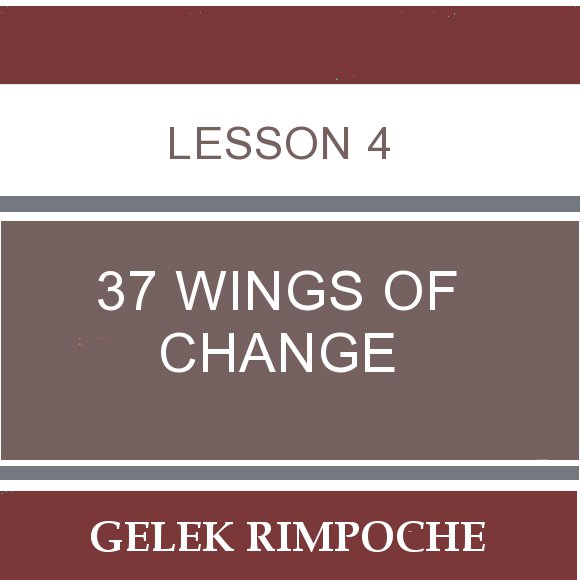
Lesson 4: 37 Wings of Change
Lesson Number 4 of 28
Lesson 4
Who are we, and where do we come from? In this lesson, Gelek Rimpoche explains how to use the Mindfulness of our Body, Feelings, Mind and Phenomena in meditation, not just to center ourselves, or to find peace, but to find answers to the deeper questions of our life in order to completely free ourselves from the suffering of the cycle of existence.
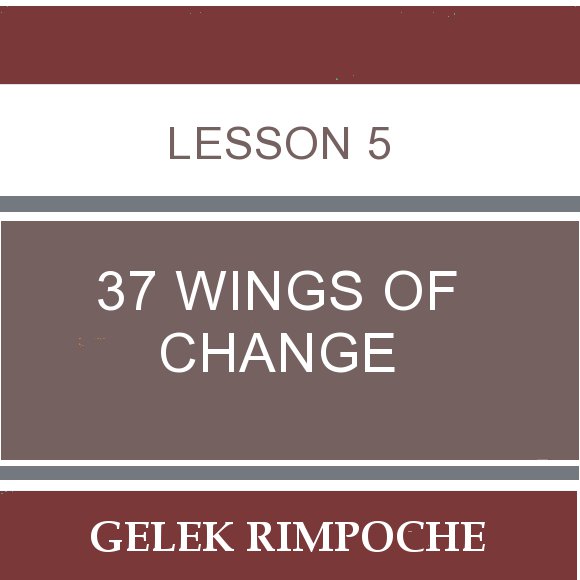
Lesson 5: 37 Wings of Change
Lesson Number 5 of 28
Lesson 5
How does our body provide the base for suffering, and is it possible to be free of that suffering in this life? In this lesson, Gelek Rimpoche discusses the mechanism by which the Four Noble Truths can be examined using the Mindfulness of our body, our feelings, and our mind. The small pleasure that we experience in ordinary life cannot compare to the joy experienced by the enlightened beings.
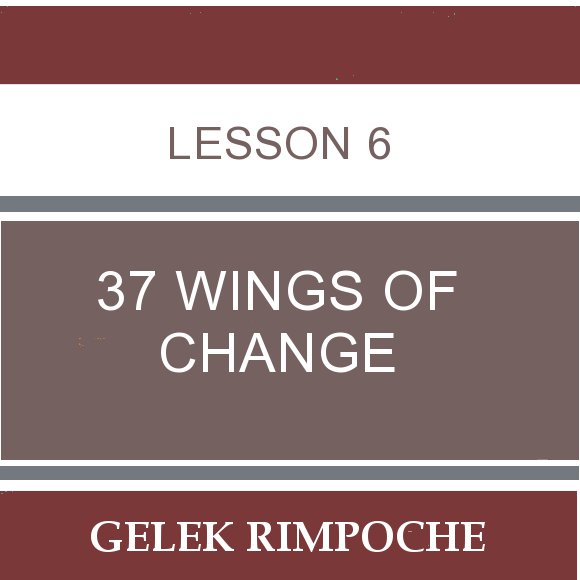
Lesson 6: 37 Wings of Change
Lesson Number 6 of 28
Lesson 6
The Four Mindfulnesses correspond to the Four Noble Truths taught by the Buddha. In this lesson Gelek Rimpoche shows that the Mindfulness of the Body links up with the First Noble Truth of Suffering, showing us deterioration. In order to separate from that suffering, we must develop the uncontaminated body of a Buddha. The Mindfulness of Feelings reveals our strong attachment, corresponding to the Second Noble Truth, because attachment is a cause of suffering. Mindfulness of the Mind corresponds to the Third Noble Truth, giving us the strength to face our fears, especially the fear of annihilation. The Fourth Noble Truth is the ability to accept the positive and reject the negative. We encounter the Four Noble Truths every day, and can use the Four Mindfulnesses every day, too.
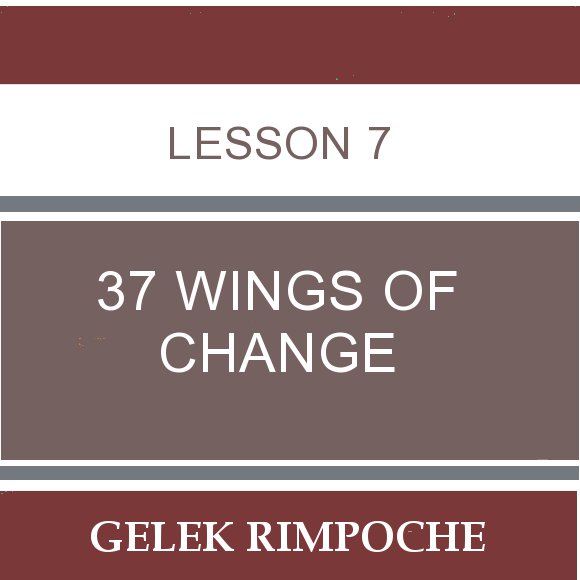
Lesson 7: 37 Wings of Change
Lesson Number 7 of 28
Lesson 7
According to the Buddha it is possible to use our spiritual path to leave suffering behind, and experience true joy. In this lesson, Gelek Rimpoche, explains how all phenomena, including pain, suffering and joy, are able to arise only if the conditions are right. By employing the practice of the Four Mindfulnesses, we are able to work with and mold conditions, allowing us to stop the growth of our negative karma, and nurture our positive karma. Rimpoche’s discussion of the Four Buddhist Logos helps with our understanding of this process.
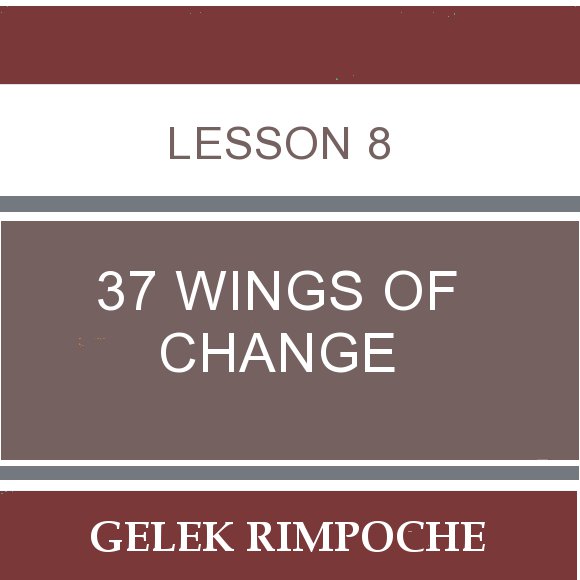
Lesson 8: 37 Wings of Change
Lesson Number 8 of 28
Lesson 8
In this lesson, Gelek Rimpoche introduces us to the Four Purities, which aid us in reducing negative karma and growing positive karma. These are: getting rid of any negatives that have grown within us, keeping any that have not yet grown from growing, developing further any positives, and trying to grow any positives that have not yet grown. As laziness is an obstacle to this process, Rimpoche emphasizes the importance of finding inspiration on the path, and developing intelligent faith to break through the stumbling blocks we encounter.
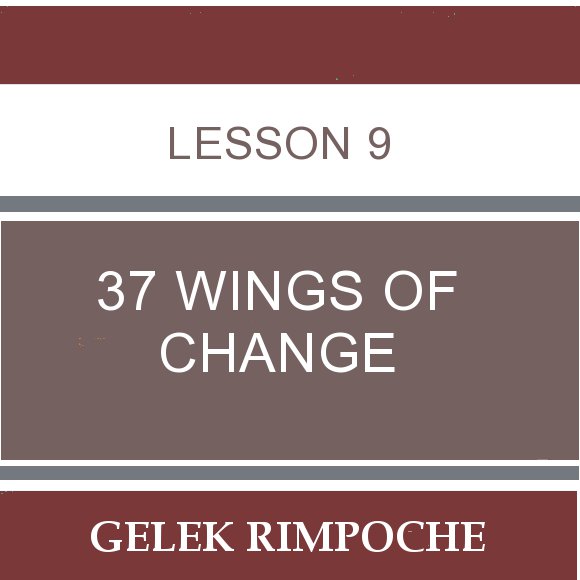
Lesson 9: 37 Wings of Change
Lesson Number 9 of 28
Lesson 9
Inspiration alone is not enough to help us along the path to enlightenment. In this lesson, Gelek Rimpoche tells us that after we have found inspiration, we must be willing to put in our own efforts in order to find success on that path. He discusses the ‘The Four Magical Legs’: Becoming Comfortable with the Practice, Enthusiasm, Attention and Concentration. These aid the practitioner in coming ever closer to enlightenment.
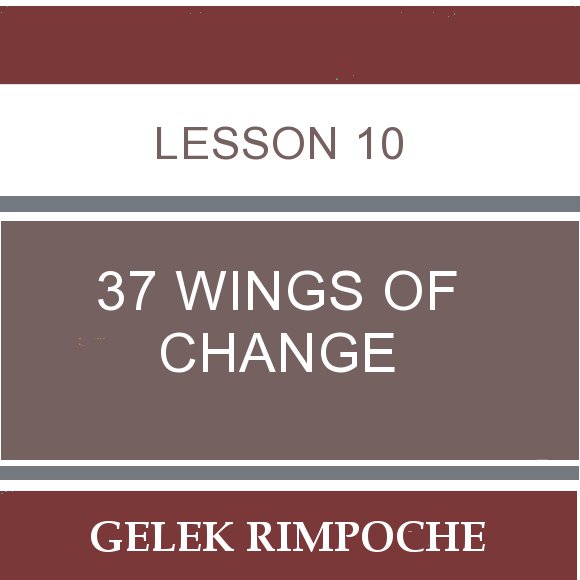
Lesson 10: 37 Wings of Change
Lesson Number 10 of 28
Lesson 10
Where do our problems originate? Do they come from friends, family, work? In this lesson, Gelek Rimpoche exhorts us not to look outside ourselves for the source of our suffering, but to look instead to our own delusions, our own ignorance. Using meditation, spurred by enthusiasm and concentration, it is possible, he says, to get to the very root of our suffering through our use of analytical and focused meditation.
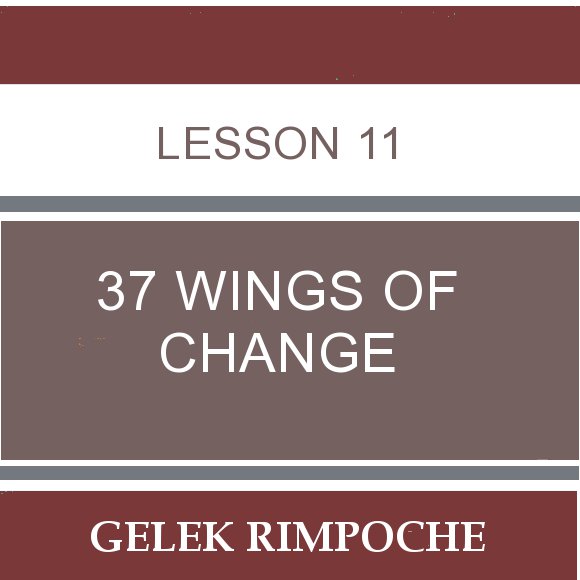
Lesson 11: 37 Wings of Change
Lesson Number 11 of 28
Lesson 11
Who or what is really to blame for the problems and difficulties of our lives? In this lesson, Gelek Rimpoche refutes the belief that a difficult childhood or innate personality characteristics could be the cause, and makes it clear that the real problem is our delusions. Although there may or may not be external evil, he says there is definitely internal, mental evil, in the form of our delusions. And it is possible to rid ourselves of them with the tool of meditation in the framework of the Four Magical Legs.
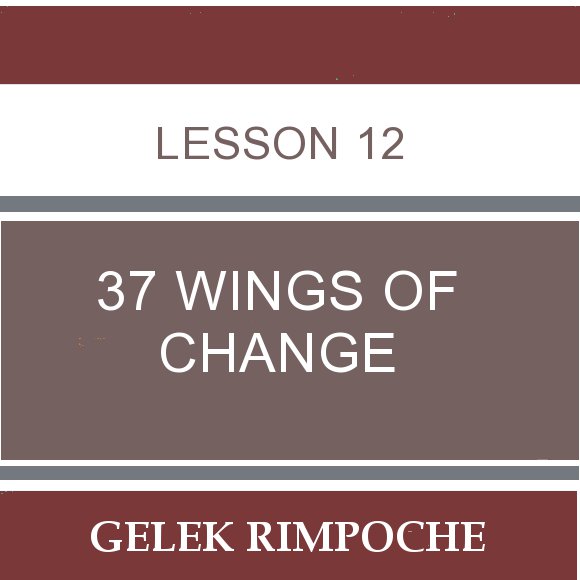
Lesson 12: 37 Wings of Change
Lesson Number 12 of 28
Lesson 12
In this lesson Gelek Rimpoche introduces the next section of the Thirty Seven Wings to Enlightenment, the Five Powers, and in particular, the first of these, Faith. How can we determine if our faith is blind or intelligent faith? Gelek Rimpoche tells wonderful stories from the history of Tibetan Buddhism which illuminate the difference between the two types of faith. He clearly spells out the three aspects of intelligent faith: recognizing the qualities of the object of our faith, desiring to gain those qualities, and then gaining total confidence in the practice.
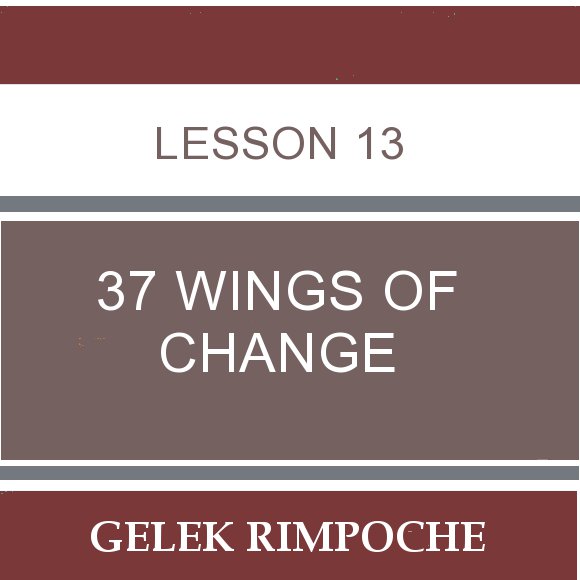
Lesson 13: 37 Wings of Change
Lesson Number 13 of 28
Lesson 13
Is it possible for us to distinguish between our true, pure nature and the emotions that we identify with? In this lesson, Gelek Rimpoche answers questions from the audience and explains how identifying and cutting the ego will lead to complete freedom from our negative emotions, yet will leave our positive emotions intact. Rimpoche also points out how exaggerated pride strengthens and expands the ego, leading to difficulties within our lives.
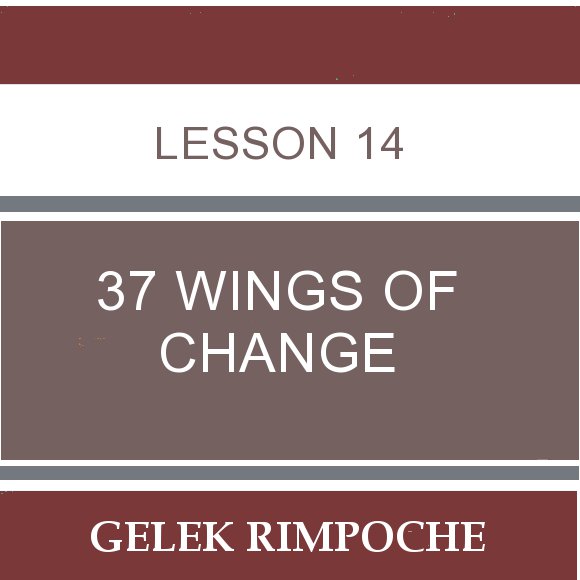
Lesson 14: 37 Wings of Change
Lesson Number 14 of 28
Lesson 14
How could we possibly be lazy when we are busy all of the time? In this lesson, Gelek Rimpoche elaborates on the second of the Five Powers, Enthusiasm. He exhorts us to examine the activities that engage so much of our life, and honestly assess how much of our life we devote to our spiritual path. Rimpoche elucidates the first type of laziness, procrastination, and shows how enthusiasm overcomes this obstacle to spiritual development.


